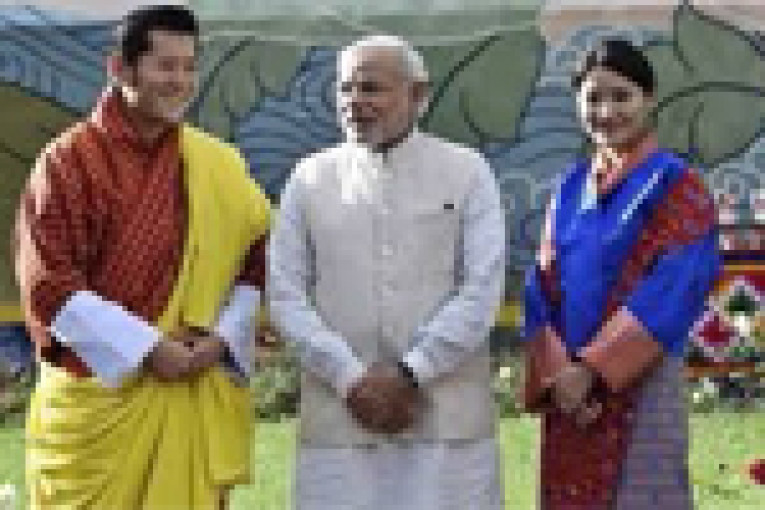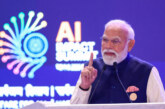
Soon after taking over as Prime Minister, Narendra Modi made it known that he would want to begin his foreign visits from the neighbourhood, both to reach out as well as a policy priority. The choice was largely between Bhutan, Nepal and Bangladesh, although Afghanistan also came up for discussion. However, the choice fell on Bhutan as Modi’s first foreign destination.
On 15 June 2014, the Indian Air Force (IAF) aircraft carrying Modi landed at Paro Airport, where Modi was received by Bhutan’s Prime Minister Tshering Tobgay, members of his cabinet and senior Bhutanese and Indian Embassy officials. Later in the day, Modi met Bhutan PM Tshering Tobgay and Bhutan King Jigme Khesar Namgyel Wangchuk.
While addressing the banquet hosted by Bhutan PM Tshering Tobgay in honour of the visiting Indian Prime Minister, Modi said that India and Bhutan are made for each other, and added that both countries are tied through culture, legacy and values. He further added: “I assure Bhutan and its citizen, whether its economic development, education, tourism or peace, India and Bhutan are ‘made for each other’; B for B – Bhutan for Bharat and Bharat for Bhutan.”
Thanking the Bhutan government and the people for the reception he received, Modi said: “Bhutan has welcomed me and my delegation with great pride and I am very grateful for this gesture. Our relation is not because of boundary but our relation is tied through a great cultural history. The color of our passports may be different but our thinking, values and legacy are all the same. Our way of living and our languages can be different but our feelings are the same which has tied us for years.”
He also said that when world talks about the GDP, Bhutan talks about happiness. There are many parameters to measure happiness. But there is one more parameter. It is important for a one’s happiness given ‘how good your neighbor is. Sometimes even after having everything one cannot live peacefully with happiness just because of your neighbour. Therefore for Bhutan, a neighbour like India is one of the most important parameter for its happiness.’
On 16 June 2014, the second day of his Bhutan visit, Modi addressed the Bhutan Parliament, wherein he harped on bilateral ties and stressed that a powerful India will prove beneficial for other SAARC (South Asian Association for Regional Cooperation) countries. He congratulated Bhutan for choosing democracy, while praising the royal family for protecting the rights of the citizens.
The visiting Indian Prime Minister left for New Delhi from Bhutan, concluding his first foreign trip after assuming office. He was given a warm send off by Bhutan Prime Minister Tshering Tobgay and several of his Cabinet colleagues at the Paro airport.
In a joint statement issued on 16 June 2014 at Thimpu, at the end of Prime Minister Narendra Modi’s two-day visit to Bhutan, the two sides also noted that security was of mutual interest and “agreed not to allow each other’s territory to be used for interests inimical to the other.” The two sides also reaffirmed their commitment to their cooperative partnership and agreed to further promote trade and investment.
The two sides recalled the free trade arrangement between them and the expanding bilateral trade and its importance in further cementing their friendship. India conveyed its decision to exempt Bhutan from any ban or quantitative restrictions on export of milk powder, wheat, edible oil, pulses and non-basmati rice. On the issue of security, the two countries agreed to continue with their close coordination and cooperation on issues relating to their national interest and not allow each other’s territory to be used for interests inimical to the other.
The two sides expressed satisfaction at the excellent state of bilateral relations and reaffirmed their commitment to further strengthen their special friendship. Bhutanese Prime Minister Tshering Tobgay conveyed his appreciation to the government and people of India for the generous development assistance since the 1st Five Year Plan in 1961.
The joint statement also said: “The two leaders expressed satisfaction over the all- round socio-economic development achieved by Bhutan with the assistance and support of India. Prime Minister Tobgay thanked India for the allocation of Rs 45 billion for the 11th Five Year Plan and Rs 5 billion for the economic stimulus plan of the Royal Government of Bhutan.”
Prime Minister Modi expressed satisfaction at India being a privileged partner of Bhutan in its socio-economic development and reassured his Bhutanese counterpart of his government’s continued commitment to capacity building, especially in the education and IT sectors in the Himalayan nation.
Reiterating their commitment to produce 10,000 MW of power, the two sides acknowledged the importance of cooperation and mutual benefit arising from the hydro power sector and expressed satisfaction on the progress being made. The two leaders expressed satisfaction with the completion of the Supreme Court building and the imminent commencement of the construction of the Kholongchhu Hydro-electric Project.
The fact that Modi chose Bhutan as his first destination of foreign visit assumes significance since China has lately intensified efforts to win it over and establish full-fledged diplomatic ties with Thimpu. Bhutan, on the other hand, has been among India’s friendliest neighbours and enjoys a close inter-dependent relationship with India. Bhutan’s economy is closely linked with India and despite pressure from powerful countries, Thimphu has been conscious in not taking any decision detrimental to Indian interest. China, for instance, has been trying hard to open a mission in Bhutan. India and Bhutan have various layers of interaction to coordinate on several fronts including foreign policy position.



